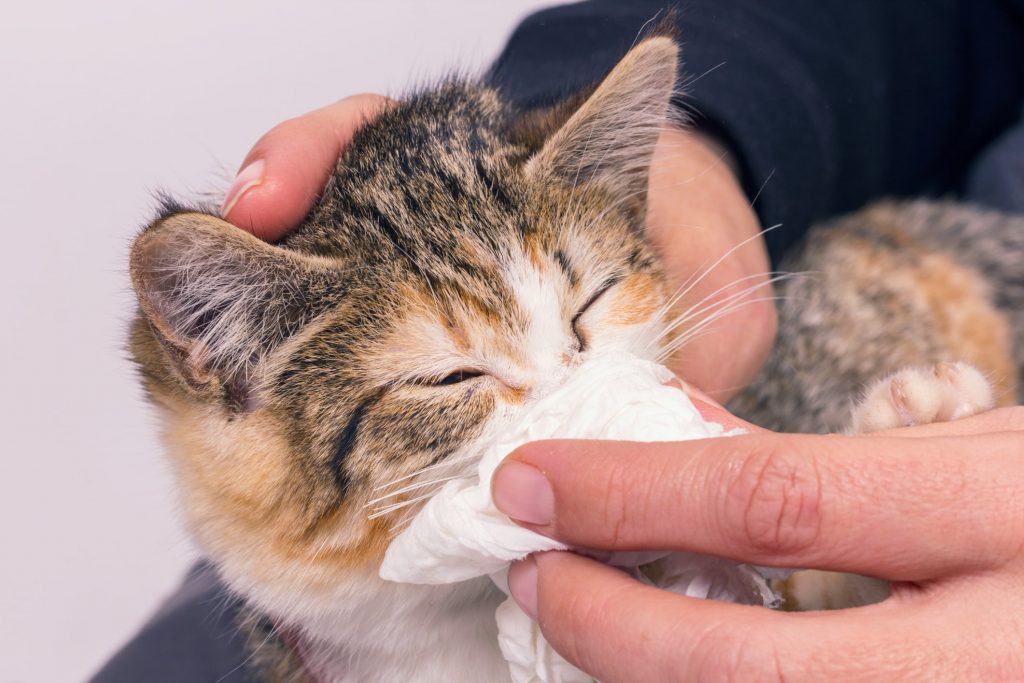A little cough here and there may be no cause for concern, but if your cat’s cough is persistent or if you notice a change in your cat’s behavior, that’s a sign it’s time to consult your vet.
Here’s what the experts say about why your cat is coughing.
Reasons Your Cat Is Coughing
Your Cat Has an Upper Respiratory Infection (URI)
If you’ve ever had a cold, then you might know what a cat with an upper respiratory infection (URI) feels like. In addition to a cough, a cat with a URI might have:
Your cat won’t need warm chicken soup to feel better, but she may want a cozy place to rest. Since URIs are contagious to other cats (but not humans or dogs), cats that show symptoms of a URI should be isolated from other healthy felines. The infection should run its course in a few days but if her symptoms don’t improve or become worse, then it’s time to see the vet.

javitrapero/iStock
Your Cat Has a Hairball
We all know hairballs are gross! After all, it is the byproduct of hair, dead skin, and digestive enzymes. But a hairball every now and again is the norm for a cat with a healthy grooming routine. If you hear the undeniable cough or retch of a hairball coming up more than once every few weeks, check out this article for preventing and treating hairballs in cats.
Your Cat Inhaled Something
From an irritating clearer to a particle of kibble—your cat could have inhaled something and is coughing it up and out of her lungs. Chances are that she can handle this on her own, but might need you to stick close to her side to monitor for any signs of choking until the coughing has subdued.
Your Cat Has Asthma
Experts say asthma results from allergens in the airway causing irritation, swelling, and reactive constriction, and this can lead to coughing. If your cat has asthma, she might show these signs in addition to coughing:
Your Cat Has Allergies
From pesky pollen to dusty litter boxes—your cat could be coughing because she’s allergic to something in her environment. Food allergies in cats will typically result in rashes on the skin and digestive upset, but environmental and seasonal allergies often cause coughing, sneezing, and itchy, watery eyes. Try removing the triggering allergen from your cat’s everyday activities, but if symptoms persist, talk to your vet about cat-friendly antihistamines.
Your Cat Has Heartworm
Heartworms are slender, spaghetti-like parasitic worms that spread through the bite of a mosquito. Luckily, heartworms can be prevented with a simple monthly topical treatment. And, bonus, the treatment usually includes defense against fleas, ticks, and other parasites.
Dr. Catherine Barnette, DVM and Dr. Ernest Ward, DVM tell PetMD that heartworms can be difficult to diagnose because symptoms can look a lot like other ailments. Here are some symptoms that could indicate heartworms in cats:
- Sudden onset of coughing
- Rapid breathing
- Wheezing
There is no treatment for cat heartworm, which can be fatal to cats, so prevention is the best medicine.
Your Cat Could Have Cancer
Although unlikely, a tumor in the chest or throat could cause your cat to cough. If your cat has a persistent cough and it’s accompanied by changes in appetite and behavior, your vet can help you get to the underlying cause.

Drazen_/iStock
Is My Cat Coughing or Choking?
According to Germantown Veterinary Clinic, pet caretakers should lookout for these signs that a cat is choking:
- Pawing at the face or mouth or rubbing of the face against a surface
- Labored breathing, gasping for air, or wheezing
- Gagging or retching
- A panicked look
- Drooling
- Blue lips and gums
If your cat is choking and you don’t know pet first aid, she needs to see the vet right away.
If you want to learn how to respond in a medical emergency, the American Red Cross offers pet first aid courses, and you can read our article about how to respond to a medical emergency in pets, too: Are You Prepared? How to Help Your Dog in a Health Emergency.
The Takeaway
Coughing in cats can have a lot of underlying causes. Some causes may run their course on their own and others may require a visit to the vet. But coughing is always something to keep an eye on in your cat.
If your cat’s cough is persistent, gets worse, or is accompanied by other changes in behavior, that’s a sign it’s time to see your vet. While you’re visiting the vet, don’t forget to ask about preventative treatments and vaccinations to keep any potential future kitty coughing under control.
